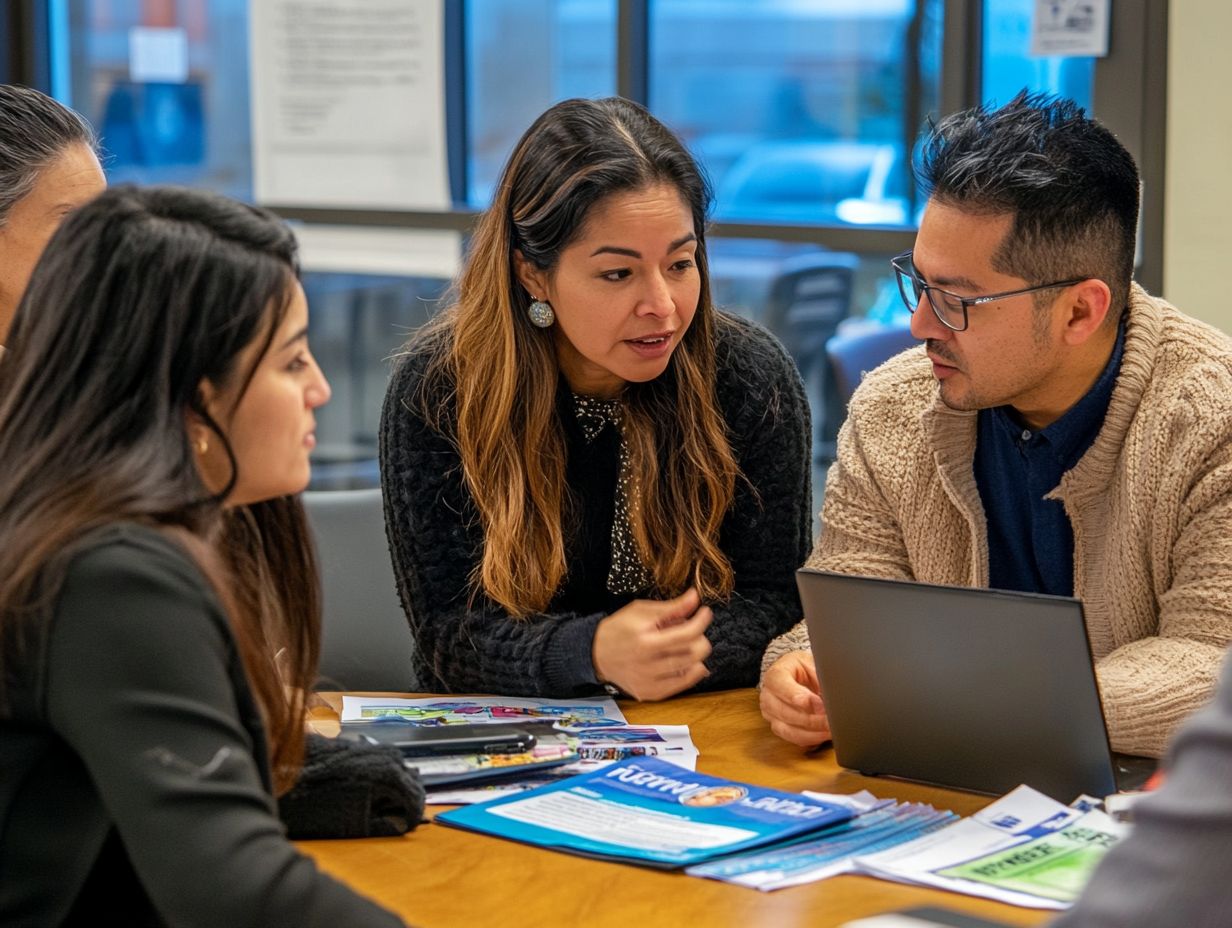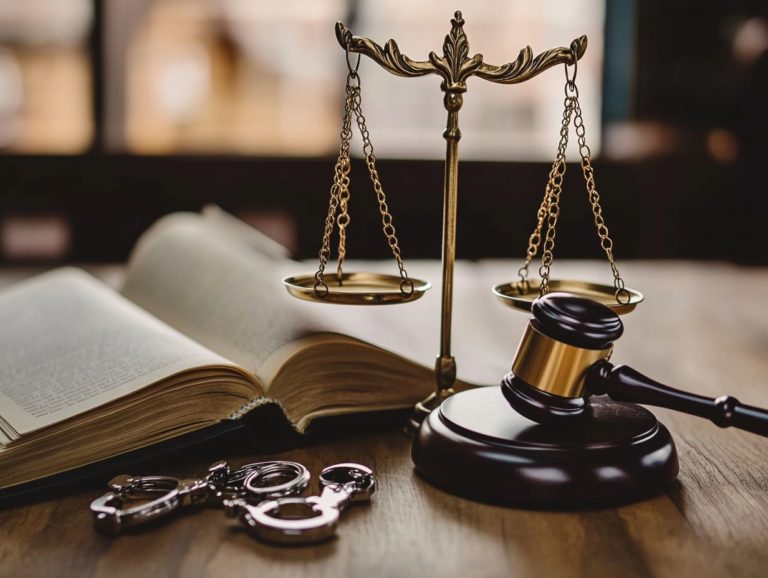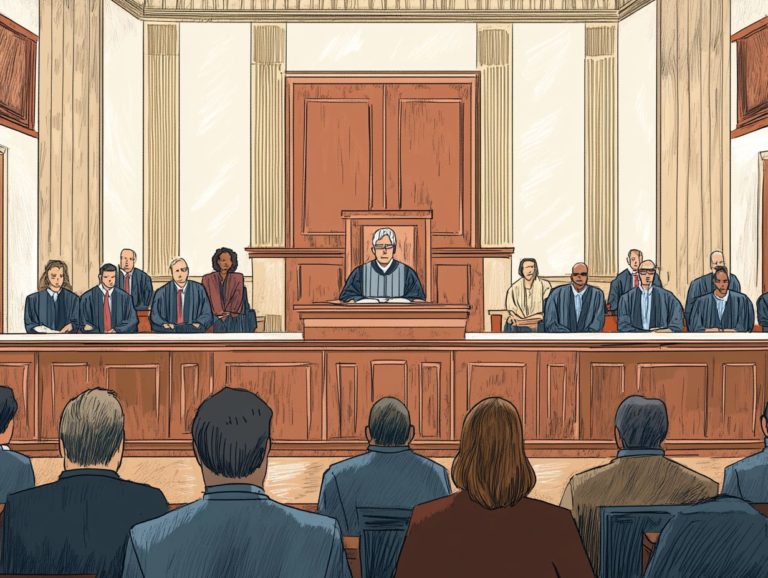How to Access Public Defense Resources?
Understanding the legal system can feel overwhelming, especially when you re facing criminal charges and can’t afford a private attorney. Public defense resources exist to ensure that everyone, regardless of their financial situation, has access to quality legal representation.
This section highlights the qualifications necessary for public defense services, along with various options available from public defenders, who are lawyers employed by the government, to legal aid organizations. Learn how to effectively access these vital resources.
Additionally, explore the benefits, such as significant cost savings, and the challenges posed by an overburdened system. Dive in as we unpack essential information needed to grasp public defense resources and their crucial role in the justice system.
Contents
- Key Takeaways:
- What are Public Defense Resources?
- Qualifications for Public Defense Services
- Types of Public Defense Resources
- How to Access Public Defense Resources
- Benefits of Using Public Defense Resources
- Challenges and Limitations of Public Defense Resources
- Frequently Asked Questions
- What are public defense resources and why are they important?
- How do I know if I am eligible for public defense resources?
- What types of legal issues are covered by public defense resources?
- How do I find and access public defense resources in my area?
- Do I have to pay for public defense resources?
- What Should I Do If I’m Not Satisfied with My Public Defender?
Key Takeaways:

Learn the eligibility requirements like income and citizenship that can connect you with public defense resources. These options, including public defenders and legal aid organizations, deliver quality representation without the hefty price tag!
What are Public Defense Resources?
Public defense resources are vital tools that uphold the right to counsel for individuals unable to afford legal representation. They tackle significant issues within the criminal justice system.
These resources include educational initiatives, funding opportunities, and advocacy efforts designed to enhance the legal expertise of public defenders while fostering community engagement.
They also draw strength from landmark legal precedents, such as Gideon v. Wainwright, which established the constitutional requirement for effective defense, and are overseen by reputable organizations like the National Association for Public Defense.
Qualifications for Public Defense Services
To qualify for public defense services, you must meet specific eligibility requirements that evaluate your financial circumstances and the nature of your legal challenges. This process ensures that your rights as a defendant are upheld.
These qualifications dictate your access to legal representation and align with broader policy reforms aimed at addressing disparities in the justice system. Organizations like the NACDL advocate for your rights and the fair treatment of all defendants, ensuring that justice is served equitably.
Eligibility Requirements
Eligibility for public defense often revolves around income thresholds designed to assess your financial need. These thresholds are shaped by factors like household income, family size, and local cost of living, ensuring support is directed to those who genuinely require it.
The process to determine your eligibility typically involves a comprehensive assessment, where you may need to provide detailed financial documentation reflecting your economic circumstances.
Accessing these resources can dramatically change your legal journey! Your access to quality legal representation can significantly influence the outcomes of your cases.
Funding opportunities for public defenders are essential, as sufficient financial resources are critical for them to provide fair and effective counsel.
Ultimately, achieving equitable access to legal representation is a fundamental aspect of justice that upholds societal fairness.
Types of Public Defense Resources
Public defense resources can be classified into several categories: public defenders, assigned counsel, and legal aid organizations. Each plays a crucial role in promoting community safety and providing equitable legal representation.
Public defenders are government-employed lawyers who represent individuals who cannot afford a lawyer. Assigned counsel consists of private attorneys appointed to represent indigent defendants. Legal aid organizations offer supplementary support and advocacy to those in need.
Collectively, these resources contribute to professional development through strategic initiatives and educational programs.
Are you looking for affordable legal help? Discover how public defense resources can support you!
Public Defenders and Assigned Counsel

Public defenders and assigned counsel are essential pillars of the public defense system. They provide legal representation for defendants who can t afford private attorneys in the criminal justice arena.
These dedicated legal professionals champion the rights of the marginalized. They skillfully navigate complex legal rules and go far beyond just showing up in court.
They dive deep into case investigations. They negotiate plea deals and advocate tirelessly for fair trials.
The distinctions between public defenders, who are part of a government agency, and assigned counsel, who are private attorneys appointed on a case-by-case basis, reveal critical issues related to funding and workload. Public defenders often juggle overwhelming caseloads with few resources.
Assigned counsel may lack the necessary support from organizations that could ease their challenges in providing effective legal defense.
Legal Aid Organizations
Legal aid organizations play a crucial role in the public defense landscape. They act as essential resources that emphasize community engagement while supporting individuals as they navigate the complexities of the legal system.
These organizations provide essential advocacy, ensuring that public defense professionals are equipped with the tools and resources they need. They offer training and educational workshops designed to enhance the skills of defenders.
This training enables defenders to tackle challenging cases with newfound confidence. Legal aid organizations also help connect clients with vital services, such as mental health support and social services, which are essential for clients facing multiple barriers.
To sustain their impactful efforts, they actively pursue various funding opportunities, including grants from governmental bodies and private foundations. This funding is critical in bolstering their operations and expanding their reach, ultimately enhancing access to legal assistance for underserved communities.
How to Access Public Defense Resources
Accessing public defense resources involves navigating an application process designed to assess your eligibility for legal support. This process ensures that those in need receive the representation they deserve within the legal system.
Community involvement often enhances this process. Local advocacy groups play a vital role in helping individuals understand their rights and prepare the necessary documentation.
Application Process and Requirements
The application process for public defense has specific eligibility criteria that you must meet to qualify for legal representation. These are the conditions you must meet to qualify for help, considering the broader context of community safety and justice.
To embark on this important journey, start by gathering essential documents such as proof of income, identification, and details related to your charges.
Once you have everything in order, eligibility is typically assessed based on your financial need and the nature of the charges against you. It s crucial to be aware of the timelines associated with the approval process, which can vary significantly depending on your jurisdiction.
This process often takes several weeks. Meeting these requirements is important as it ensures you gain timely access to vital legal resources.
This access enables you to effectively advocate for your rights as you navigate the complexities of legal challenges.
Benefits of Using Public Defense Resources
Using public defense resources can open doors to amazing advantages, including cost savings and access to high-quality representation. This upholds the vital principles of a fair trial essential to the integrity of the justice system.
These resources guarantee that defendants, irrespective of their financial circumstances, can secure competent legal counsel. This access is crucial for effectively navigating legal challenges and advocating for their rights.
Don t hesitate take the first step toward securing your legal rights today!
Cost Savings and Quality Representation

One of the primary advantages of utilizing public defense resources is the significant cost savings tied to securing quality legal representation. This is essential for safeguarding your rights amidst various legal challenges.
By relieving the financial burden on individuals who might struggle to afford private counsel, public defenders foster fairness within the judicial system.
Research shows that local areas with strong public defender programs often enjoy better outcomes for defendants, including lower incarceration rates. A report from the National Association of Criminal Defense Lawyers reveals that public defenders secure favorable plea deals in over 80% of cases.
With dedicated resources at their disposal, public defenders provide comprehensive consultations, explore all legal options, and mount a robust defense against charges. This ultimately levels the playing field in court.
Challenges and Limitations of Public Defense Resources
Public defense resources have significant advantages. However, they also face many challenges.
An overburdened system plays a pivotal role in the public defender crisis. Potential biases can influence the quality of legal representation.
These obstacles make it hard for public defenders to help, raising valid concerns about the fairness and effectiveness of legal outcomes for defendants.
Overburdened System and Potential Biases
The overburdened public defense system is a pressing concern. Potential biases can jeopardize the quality of legal representation for defendants, especially those from marginalized communities.
Did you know many public defenders handle over 100 cases at once? This overload affects their ability to prepare properly.
The statistics are eye-opening: minorities are disproportionately represented in these figures, frequently facing harsher sentencing and longer pretrial detention. Such inequities foster a cycle of injustice.
When defendants lack adequate legal counsel, the chances of unfair legal outcomes increase. This perpetuates a system that undermines the rights of the most vulnerable individuals.
Frequently Asked Questions
What are public defense resources and why are they important?
Public defense resources are services provided by the government to individuals who cannot afford to hire a private attorney. These resources ensure that everyone has access to legal representation, regardless of their financial situation.
How do I know if I am eligible for public defense resources?

Eligibility can differ by location. Generally, individuals with limited income and assets are eligible. It is best to consult with a legal aid organization or public defender’s office to determine your eligibility.
What types of legal issues are covered by public defense resources?
Public defense resources cover a variety of legal issues, including criminal defense, immigration, and family law matters. However, the specific types of cases covered may vary depending on the local area and available resources.
How do I find and access public defense resources in my area?
You can find and access public defense resources by contacting your local public defender’s office or legal aid organization. They provide information on available resources in your area and assist you in accessing them.
Do I have to pay for public defense resources?
No, public defense resources are provided free of charge to eligible individuals. However, certain fees associated with filing legal documents or attending court proceedings may need to be covered by the individual.
Understand your rights and seek public defense resources before facing legal challenges!
What Should I Do If I’m Not Satisfied with My Public Defender?
If you’re unhappy with your public defender, take action! You can request a new one or consider hiring a private attorney.
Using legal aid services is another option. It’s essential to share any concerns with your assigned defender to see if they can be fixed.






